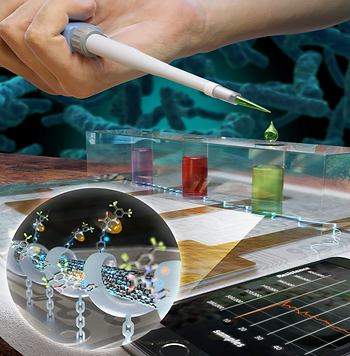

Division of Materials Science and Engineering
Hanyang University
IoT Sensor Platform
Our research focuses on the development of IoT-based sensor platforms for environmental monitoring and healthcare applications

Breath Analysis for Healthcare and Disease Diagnosis
Human breath contains various biomarker species that are related to physical conditions. The analysis of exhaled volatile organic compounds (VOCs) can diagnose certain diseases such as cancers and even virus infection.

Solute Sensors for Real-time Wireless Detection
The main goal of this project is the development of real-time wireless sensors that can detect various solute species in aqueous solutions.
▶ Ionic solutes:
: Anions (acetate, chloride, etc.)
: Cations (mercury, cadmium, copper ions)
▶ Non-Ionic solutes
: Dopamine, tannic acid, cholesterol,
morphine, etc.
We are working on the synthesis of diverse receptors that can directly interact with solutes through the chemical binding.

Nanostructures and Materials Development
1D Nanostructures with Morphological and Compositional Engineering
Highly porous 1D nanotube structures were synthesized by an inorganic nanofiber templating route. The inorganic nanofiber templating rough is advantageous considering the high surface area as well as open porosity. The inorganic nanostructures can be used as sensing materials for chemical sensors for application in environmental monitoring and healthcare.

2D Materials and Sensing Layers
There are a number of emerging 2D layered nanosheets for chemical sensing applications. Atomically thin 2D nanosheets have unique electrical, chemical, and mechanical properties. These 2D nanosheets can be assembled on a flexible substrate for potential application in wearable chemical sensors.

Molecular Synthesis for Sensing Receptors
Designing and synthesis of receptors are important to selectively detect target species through chemical interactions. The unique structures of receptors are synthesized to systemically investigate their chemical binding properties.
Carbon nanotubes are incorporated as an electrical transducer to transfer chemical interaction into an electrical signal in both gas and liquid phase environments.
